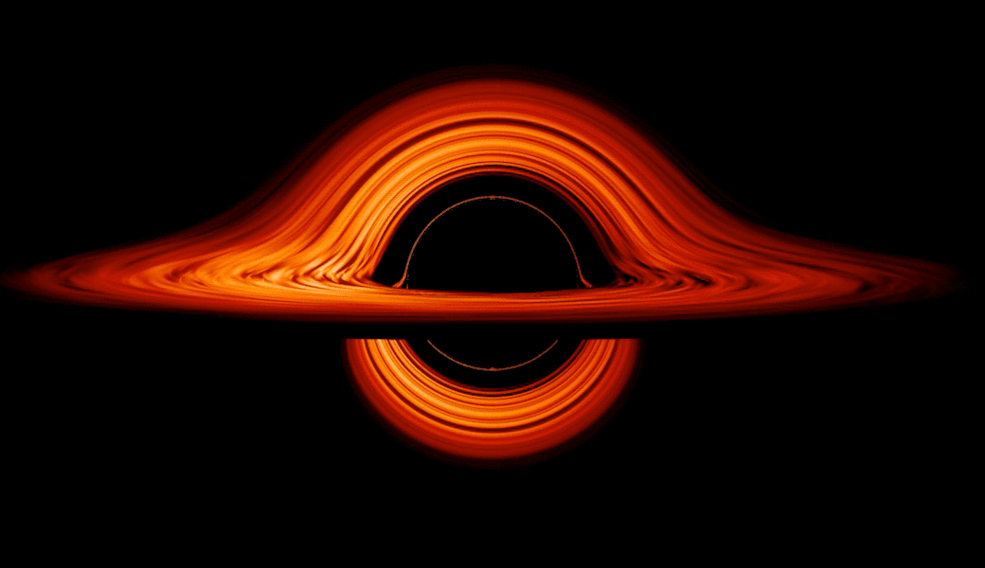Text by CLOT Magazine

I used to think of black holes as cosmic voids bringing death and destruction, but working with scientists like Anna Barnacka and Fabio Pacucci has shown me that nothing could be further from the truth! – tells David Ibbett referring to his new project. The composer, educator, and musical advocate for science is launching a new Kickstarter campaign (live until 17th December) to fund Black Hole Symphony. Based in Boston, Ibbett is the director of the Multiverse Concert Series, a project that combines music and science in live performance. The composer certainly has a long trajectory of collaborating with scientists (ie he was the first Guest Composer at Fermilab, the Fermi National Accelerator Laboratory) and has developed several projects using sonified data, musical metaphors for scientific concepts, and experimental sound and images from contemporary research.
Black Hole Symphony is an immersive experience combining orchestral music, planetarium visuals and the science of black holes – produced in collaboration with the Museum of Science, Boston.
Due to the premiere for performances in Summer 2022, the team has launched their 2nd Kickstarter Campaign to raise funds to record a full symphony orchestra for the symphony’s soundtrack. For the performances in Boston, the solo parts will be played by a chamber ensemble of live musicians clustered around the central planetarium projector, including electric guitar solos from Matt Russo of SYSTEM Sounds. One day, David hopes, he can find a venue that has room for both a full orchestra and a planetarium dome…
The project started around 3 years ago when Anna Barnacka of the Harvard Smithsonian Center for Astrophysics sent David her own sonification of gamma flares originating from a black hole’s accretion disk. She asked me if I could do better! – David says. He continues: Working on that dataset together led to the first melody of Black Hole Symphony – a wide-ranging arpeggiaic line that shows the massive variability in gamma rays as they ebb and flow from the black hole’s accretion disc. Anna and I have become dear friends over the years.
We are equally passionate about science and music, and our opposite expertise makes us a great team! Our conversations made it clear that our initial sonification was part of a much larger story of black holes and their role in our universe. To tell such a colossal story, we needed an epic musical form, so the idea of a symphony was born. Multiverse Concert Series has an ongoing collaboration with the Museum of Science, Boston, and we are thrilled that they are creating planetarium visuals as an integral part of the symphonic journey that will premiere to live audiences in June 2022.
We were curious to know what it is about sonifying black holes, and what it does involve; for which David gave us an in-depth explanation: Although a black hole itself has no emissions – even light cannot escape – the Active Galactic Nucleus that surrounds it is an immense source of powerful emissions that span the entire electromagnetic spectrum. T
o help capture these phenomena in music, Anna introduced me to her colleague Mojegan Azadi, also of the CFA, who models black hole galaxy emissions and how they correspond to the physical structures of the galaxy. As you can imagine, this is an immense amount of data! It took an entire summer to decide on a method to map around 60 octaves of light into 10 octaves of sound.
This resulted in the symphony’s ‘black hole chord’ – a harmony with distinct musical regions associated with the relativistic jets, stars of the galaxy, dust torus, broad-line clouds and spinning accretion disc. This chord forms the heart of the symphony: each movement is based on the harmonic regions that correspond to our progress on the journey from interstellar jets to the event horizon.
For the performance aspect of the project, Black Hole Symphony is being built by Multiverse and the Museum of Science, Boston, to tour. It will head to the Denver Museum of Nature and Science in the fall of 2022 after its summer premiere in Boston. They plan to tour the piece to planetariums worldwide to share the joy of music, science, and the fascination of black holes with their incredible sights and sounds!
Ibbett ends up by saying that through this project, he’s learned that black holes are powerful engines of light and creativity – they hold the universe together as the gravitational anchors at the heart of every galaxy. They are surrounded by beautiful cosmic sights that warp space and time. This is the story they want to tell with Black Hole Symphony – we all need to get to know black holes better! They are the silent conductors of our unfolding cosmic symphony.
To access the fundraiser and help Multiverse Concert series to reach their goal follow this link.






